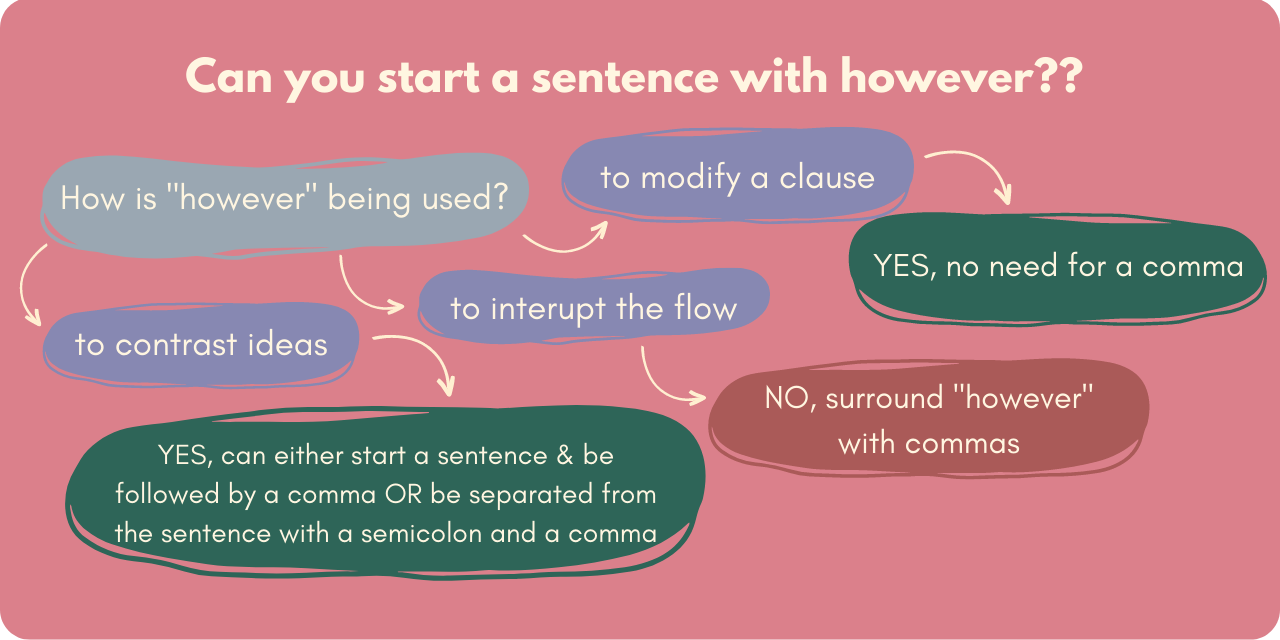As a connector word, specific rules govern the usage of “however.” Many people struggle to use the word properly because it is a conjunctive adverb rather than a conjunction. Some also pause when wanting to start their sentence with it.
With a bit of study, however, anyone can use these words without violating established grammatical rules. As you are here, we might as well find the solution and end any doubts you may have when making use of this valuable word.
Can I Start a Sentence with “However?”
Whether or not you can begin a sentence using “however” depends on how you are using the word itself. As a conjunctive adverb, there are two significant roles the word can play.

“In Whatever Manner” and “To What Extent”
If it is modifying a clause, it is perfectly fine to begin a sentence using “however.” Remember that a clause is a collection of words that include a subject and verb to express an idea.
However you choose to climb the wall, be careful.
Rather than expressing any contrasting idea, in this sentence, “however” is used to explain “in whatever manner.” When used in this fashion, or to describe “to what extent,” you may safely begin a sentence with the conjunctive adverb, and no additional punctuation is required.
Let’s look at a few more examples of this usage:
However far behind the team fell, they refused to give up.
In this case, no matter the extent that their score falls behind, you can count that they will continue to play to win. Because this falls under the category “to what extent,” this usage is acceptable.
However sick you are, you still need to pick up Clarissa from choir practice.
Another example of “to what extent,” the word is not being used to show a direct contrast of one idea with another, but to express that this person is not getting out of picking up poor Clarissa.
However the chips may fall, the gamble is worth it.
In whatever manner the chips fall, the writer believes the risk is acceptable.
Related: Check out our article about starting a sentence with Yet.
When Expressing a Contrasting Idea
When “however” is used to express a contrast between two ideas, special punctuation accommodations govern this usage. It is usually better to combine the two ideas (clauses) using “however” as the glue rather than starting an sentence.
A helpful tip to keep in mind: to express contrast, “however” shares a meaning with “but.”
To whit:
Sammy hates onions, but he loves onion rings.
Sammy hates onions; however, he loves onion rings.
Hopefully, you noticed an important difference between the two in punctuation. This is because “but” is a coordinating conjunction and exists to connect sentences. Because of the nature of the beast, only a comma is required before the conjunction when combining two independent clauses.
Because “however” is a conjunctive adverb, the rules are slightly different but not really more complicated. You simply follow this rule:
Complete sentence; however, complete sentence.
Remember, you must be expressing a contrast, such as you would use with but or nevertheless.
Brooke studied for the test; however, she failed it.
The contrast here is that you would expect her to succeed after studying, but sometimes life doesn’t work out that way.
The great thing about using semicolons correctly is that they can make you look smart. However, think of semicolons like salt. Without any, your writing can be bland, but the consequences can be disastrous if you add too much.
A nice sprinkling is sufficient – a single semicolon every paragraph or two.
To eliminate the overuse of the semicolon to join sentences with conjunctive adverbs such as “however,” you may begin a sentence with it when showing contrast with a previous sentence as long as you follow it with a comma.
Brooke studied for the test. However, she failed it.
The sentence is nearly the same, only instead of a semicolon, we have a complete stop with a period and capitalized “however” since it begins a new sentence.
Here’s a little taste of some more split sentences, followed by their combined counterparts:
Dark clouds filled the sky. However, it didn’t rain.
Dark clouds filled the sky; however, it didn’t rain.
Pricilla’s alarm failed to go off. However, she still made it to work on time.
Pricilla’s alarm failed to go off; however, she still made it to work on time.
Either way is acceptable. However, many people frown on using a connecting word to begin a sentence, so you may want to avoid it when writing important paperwork such as job applications. Better safe than sorry.
Another Way to Use “However”
Finally, if you were perceptive, you may have noticed that I used the following sentence in the second paragraph:
With a bit of study, however, anyone can use these words without violating established grammatical rules.
Perhaps you thought, “Wait a minute, this doesn’t fit any of the above rules!” If you did, you are correct.
Notice that rather than combining contrasting ideas or showing a manner or extent, the word is interrupting the flow of another sentence. If used as an interrupter, you place a comma on both sides of the word to show that it is not essential to the sentence itself but is extra.
When cooking, however, you should follow the recipe closely.
As you use “however,” however, you should take the time to ensure you have done so correctly.






